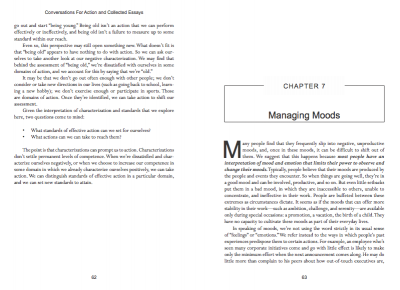Chapter 7: Managing Moods
This essay summarizes Fernando Flores’ view on managing moods. It came from a compilation of talks, internal documents, and client papers.
In Flores’ words:
Many people have trouble managing their moods in a way that allows them to be productive. I believe this is so because most people are attached to an interpretation of mood and emotion that limits their power to observe and shift their mood. Typically, we think that our moods are biological responses to whatever is happening in our lives. So when things are going well we are in a good mood and we can be involved, productive, and so forth. But even little setbacks put us in a bad mood, in which we are inaccessible to other people, unable to concentrate, and ineffective in our work. We are buffeted between these extremes as circumstances dictate. And only rarely do we experience the moods that allow us to feel stable, creative, innovative, and so forth. These are moods that I call “joyful challenge” and “serenity”.
I believe there is a way to manage moods and live in these more positive moods. It lies in a different interpretation of what moods are, one that allows us to take action when we find ourselves slipping into bad moods. The central notion is that moods can be viewed as assessments you are making about your future prospects. When you make a mistake, you expect that you will be criticized for it, and your mood darkens. If you complete a project, you anticipate rewards and praise, and you become overjoyed. So moods are connected to how we think about the future. I claim that to generate the moods of joyful challenge and serenity, we must understand that people generate the future in commitments they make to each other and the actions they take together.
By taking moods out of the purely personal, subjective realm and into the realm of assessment, companies can begin to take action to produce and shift moods in their organizations, teams, and customer relationships. We can design practices for helping people to shift out of unproductive moods, for building trust in internal and customer relationships, and for cultivating a mood of satisfaction with customers.

Jump to chapter: